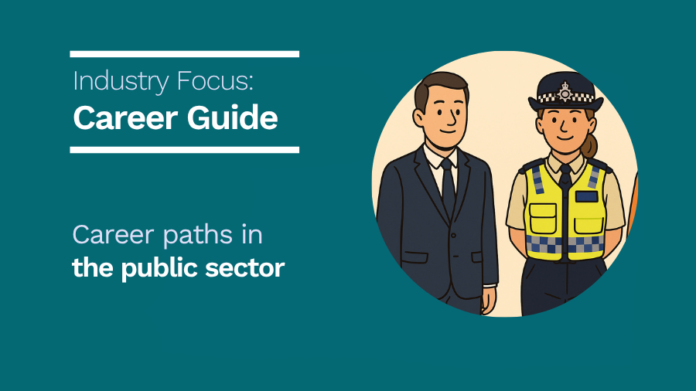For many ex-forces personnel, continuing a life of public service feels like a natural next step. A career in the public sector offers structure, security, and purpose – along with the opportunity to continue making a difference in civilian life.
Whether it’s supporting local communities, delivering frontline services, or helping to shape national policy, public sector work encompasses a wide range of roles. And with their discipline, resilience, and team ethos, veterans are often a perfect match.
Why the public sector suits service leavers
Military life instils a sense of duty, teamwork, and accountability. These qualities are valued throughout the public sector, where roles often involve working under pressure, following clear protocols, and dealing with members of the public in challenging circumstances.
Many veterans are already experienced in administration, logistics, emergency planning, safeguarding, and personnel management. The public sector not only recognises these transferable skills – it actively seeks them out.
From local government to national agencies, and from healthcare to housing, there are opportunities at every level. What’s more, many public bodies have veteran recruitment policies in place, along with guaranteed interview schemes and resettlement partnerships.
A wide range of paths
One of the great strengths of the public sector is its sheer breadth. Some veterans move into law enforcement, fire and rescue, or ambulance services. Others find roles in the civil service, local councils, or the NHS.
Administrative and operational roles are often the starting point. For example, someone with experience in logistics might join a council’s waste management or highways department. Those from a communications or intelligence background may be suited to roles in government departments, emergency planning units, or regulatory agencies.
Facilities management, IT support, community liaison, and security are also common entry points. And for those with leadership experience, supervisory or managerial roles in housing, social services, or healthcare operations can offer a fulfilling long-term career.
In short, the public sector is not a single employer – it’s a network of organisations with different missions but shared values. And those values often align closely with the ethos of military life.
Spotlight on the civil service
The UK Civil Service employs over 500,000 people across departments including the Ministry of Defence, Home Office, HM Revenue and Customs, and the Department for Work and Pensions.
Veterans are encouraged to apply for roles through the Great Place to Work for Veterans initiative, which guarantees interviews for eligible former service personnel. Positions span everything from passport processing and policy support to border operations and cybersecurity.
Many civil service roles offer hybrid or remote working, stable hours, and clear career progression. Veterans also tend to adapt well to the Civil Service’s structured grading and appraisal system, which rewards performance and reliability.
Working in local government
Councils across the UK deliver essential frontline services – from road maintenance and waste collection to housing, planning, and environmental health.
Ex-service personnel can thrive in roles such as environmental enforcement officers, emergency response planners, housing caseworkers, or community safety officers. Councils often offer flexible working hours and place a high value on public service experience.
Those who have worked with vulnerable populations or have safeguarding training may find opportunities in social care departments or youth support services.
Policing and uniformed services
Many veterans naturally gravitate toward policing, fire and rescue, or ambulance services. These organisations value prior experience in high-pressure environments and often provide accelerated training routes for ex-military candidates.
While frontline roles are common, they’re not the only option. Many forces leavers move into control rooms, intelligence teams, logistics units, or training departments within these services.
Transferable skills in demand
The public sector rewards a broad set of capabilities. Military personnel bring with them strong decision-making, clear communication, and a commitment to public safety – all vital in environments where trust and accountability are key.
Security clearance and vetting experience can also be advantageous, particularly in defence-related roles or sensitive government departments. Likewise, experience with health and safety, safeguarding, and structured reporting processes gives veterans an edge in regulated sectors.
Many public sector roles involve dealing with complex systems, multi-agency coordination, and public accountability. Veterans, used to structure and command chains, often transition well into these settings.
Training and qualifications
Veterans looking to move into public sector work can often use Enhanced Learning Credits (ELCs) to gain relevant qualifications.
Courses such as ILM Leadership & Management, NEBOSH Health & Safety, IOSH Managing Safely, and safeguarding or first aid certifications are common pathways. Some roles may require specific vocational qualifications, such as in social care or environmental health, but many entry-level roles provide on-the-job training.
If interested in a particular route – like policing or civil service – it’s worth checking the eligibility criteria and training requirements for those organisations in advance.
Support available
The MOD’s Career Transition Partnership (CTP) provides resources and support for those entering public service roles, while organisations like the Forces Employment Charity (formerly RFEA), SaluteMyJob, and Walking With The Wounded also offer guidance and training for veterans entering civilian employment.
Many public sector employers also take part in the Armed Forces Covenant, committing to fair recruitment processes and support for veterans and reservists.
In summary
For those leaving the military but not the mindset of public service, a civilian career in the public sector offers meaning, structure, and stability. From local councils to government departments, and from community health teams to emergency responders, veterans bring real-world experience that can have a lasting impact.
It’s a chance to serve again – this time in a different uniform, but with the same sense of purpose.
Keep an eye out for more insights in Pathfinder’s ‘life after service’ series.

